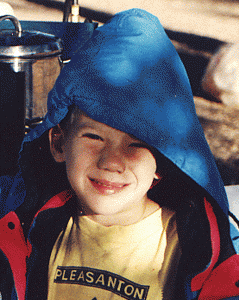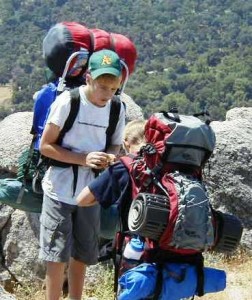 Backpacking with small children is mental, and I mean that in every possible sense. To do so requires Olympic class mental gymnastics and probably some mandatory drug testing. Consider for a moment oil and vinegar. At first they don’t seem to go well together, but if you shake them really really hard it can be absolutely fantastic. Well its the same way with backpacking and children, minus the really hard shaking. My lawyer and therapist recommended I add that last part.
Backpacking with small children is mental, and I mean that in every possible sense. To do so requires Olympic class mental gymnastics and probably some mandatory drug testing. Consider for a moment oil and vinegar. At first they don’t seem to go well together, but if you shake them really really hard it can be absolutely fantastic. Well its the same way with backpacking and children, minus the really hard shaking. My lawyer and therapist recommended I add that last part.
Approached in the right way, backpacking with children can indeed be fantastic. Seeing the outdoor world through their curious eyes can open ours in ways we never knew possible. Assuming you are mental enough, as I was, to take these wild ones into the wild, here are some things you may want to consider.
Did I mention it is mental?
Age and physical strength are not the most important factors in determining if someone is “ready” for backpacking. It’s mental. With the right mindset, children can do amazing things. A properly motivated tiny tyke can pound out mile after mile, and smile after smile. However with the wrong attitude even a 5’10”, 160 pound teenage boy is a nothing more than a whining baby about his twisted shoulder straps, chaffing hip belt, and missing wireless game controller.
Physical conditioning can enhance safety and improve your overall enjoyment. Limiting backpack weight to no more than 25-30% of body weight is a pretty good guideline for children. However before you care for any of those, first evaluate mental state, both theirs and yours.
How to carry on when children are carrying on?
Most parents of small children are well aware their bones can liquefy. We have all seen it. A child expresses desire at the local grocery store. You explain calmly and rationally why it is not appropriate at this particular time and zap, the bones are liquid. Suddenly you are Steve McQueen in 1958, trying to act cool before the amoeba-like blob at your feet. Clean up on isle six is not going to cut it. Minus a hand held fire extinguisher, you are at a total lose as to what to do next. Now imagine a similar scene playing out three miles down a mountain trail. The good news is the grandmother death-gripping a shopping cart walker, mumbling something about your parenting skills, is far far away. The bad news however is so is your car.
Surely it is more than coincidence that patience and patients sound so similar. Dehydration is probably the most common wilderness cause of emotional melt down. One solution is a good swift punch, preferably Gatorade fruit flavored. If not, water is a viable option. One personal piece of advice is to avoid water purification techniques which render water “disgusting” to children. Filtering or boiling water does not leave an after taste, and kids might actually drink it. Treating with Halogen leaves water tasting eerily like a community swimming pool. If you do flavor water, make sure the purification process is complete before you add the Crystal Lite or other additive.
Prevention
Backpackers are often obsessed with ounces of weight. Backpackers with small children should obsess over ounces of prevention. Prevention is key to avoiding mental breakdowns, whether yours or your kids. The ability to anticipate problems and head them off at the wilderness pass is a worthy skill. Here are some approaches to consider:
Happy Meal Approach
 Happy meals are fun because they are small, well packaged, and contain a prize. When selecting wilderness outings for children, make sure to include all three. Avoid super sizing. Don’t bite off more miles than your kids can shoe. Make sure the trek is easy enough for their little legs, or your larger tired ones when you need to carry them. Position the trip as an adventure. Walking under burden of load, though perhaps a personal joy for you, is understandably torture for a child. Know your child’s interest and find ways to trick them into walking. Identifying lizards, chasing frogs, or hunting geocache treasures are all legitimate reasons for kids to move. Backpacking is not. When one motion motivation wears out, come up with another quickly. Try not to lose momentum. Also make sure the destination is a prize in its own right. A swimming hole, frog pond, or waterfall are potential worthy destinations. If your child cannot tell the difference between the final destination and where you were 30 minutes earlier, you have failed.
Happy meals are fun because they are small, well packaged, and contain a prize. When selecting wilderness outings for children, make sure to include all three. Avoid super sizing. Don’t bite off more miles than your kids can shoe. Make sure the trek is easy enough for their little legs, or your larger tired ones when you need to carry them. Position the trip as an adventure. Walking under burden of load, though perhaps a personal joy for you, is understandably torture for a child. Know your child’s interest and find ways to trick them into walking. Identifying lizards, chasing frogs, or hunting geocache treasures are all legitimate reasons for kids to move. Backpacking is not. When one motion motivation wears out, come up with another quickly. Try not to lose momentum. Also make sure the destination is a prize in its own right. A swimming hole, frog pond, or waterfall are potential worthy destinations. If your child cannot tell the difference between the final destination and where you were 30 minutes earlier, you have failed.
Bendable Buddies
Be flexible. Sure you probably had it all planned out, and yes it is frustrating when it does not go as planned. But frankly, kids don’t measure conformance to plan as an indication of pleasure, and neither should you.
Gaming their Systems
Entertainment can be an effective distraction. When little mouths are engaged in rhyming games, I spy games, or silly singing, they are not available for I’m tired, when are we gonna get there, and you said this would be fun! Think of games as potential solutions to these boredom problems:
- Driving to and from the trailhead
- Actually hiking on the trail
- Staring at each other in camp
However, do not assume what is entertaining to you is entertaining to your child. Do not mistakenly believe you can create a passion for wild flower identification just because the television is too far away to see. Take something you know they will like and let them push it a little further. Water, fire and throwing things all offer great potential. For example, don’t explain why you can’t throw rocks here. Find a different place you can throw rocks and spend time throwing them together. Just not at each other.
Conclusion
Our life comes pre-loaded with a limited number of potential backpacking days and nights. It is fairly clear that when our founding fathers proclaimed the right to pursue happiness, they were specifically referring to backpacking. Do not deny yourself or a child the opportunity to maximize this pleasure. Besides, when you are old and weary, how will you possibly convince your children to carry your backpack if you weren’t willing at some point to carry theirs?
Dismissed. Carry on!
